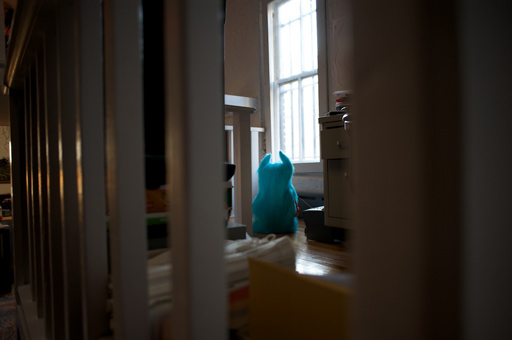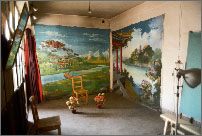April 9, 2013
Ebert in email
RIP Rogert Ebert.
I had many email interactions with him when I was working in Hollywood, most of them pleasant. But my favorite exchange was this one which was his response to Bring It On which I was helping promote. I had not known he had seen the movie yet and had sent him a studio blurb which described the movie as a girl power flick. He did not mince words.
Roger Ebert
REBERT@compuserve.com
August 18, 2000Girl power? Bimbo power, I'd say. Wait until you see "Girlfight."
"Bring It On" is so thin, shallow, callow, and ripe with missed opportunities! It needed to be an R so that it could have explored the material it waters down.
Best,
RE
Related: A bad review
November 22, 2011
Georges Melies
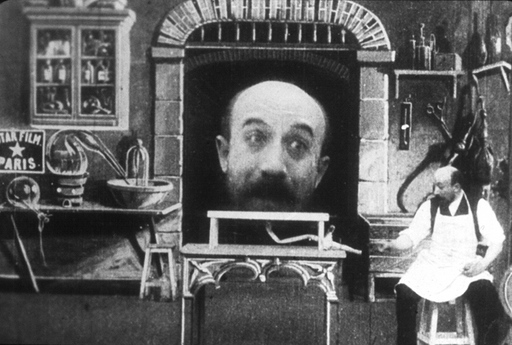
With Scorsese's Hugo coming out soon I thought it would be a good time to revisit some of Georges Melies' early films (Hugo features a fictional Melies). Melies was a magician who originally used his films in his act, but the films quickly took over and by 1898 he was the largest producer of staged films in France.
Melies was one of the first filmmakers to use film to tell a story with sets, he created the first proper movie studio (with moving sets, and glass walls to let in the maximum amount of light), he was one of the first filmmakers to experiment with long form film, and he shot the first erotic film (After the Ball) and of course the special effects techniques he perfected still underly most modern effects. Melies' special effects techniques are even more impressive if you consider that most were created in-camera by rewinding and re-filming various parts of the scene. He made hundreds of popular films, but never made much money from them. Distribution was expensive and he had problems with counterfeiters. (Thomas Edison copied and distributed Melies' films in the US and never paid Melies a dime.) By 1913 his film was failing and he sold what remained of it. Most of Melies' archives were destroyed (the majority of his cellulose film stock was melted down by the French Army to make boot heels). His wife died and he married his mistress. For many years he was a toy salesman at a kiosk in Montparnasse station. His plight was discovered by a writer in a French film journal and soon after some of his films were discovered, restored and exhibited. A group of filmmakers put together a pension fund for him and he spent his last years in a home for cinema veterans.
Thanks to web, Melies' existing films are very easy to find. I've included a few below (my favcorites are starred).
Note most of these films include bad modern soundtracks and are better watched silent.
1896 - The Haunted Castle ✶
1896 - A Nightmare
1896 - The Vanishing Lady
1897 - The Haunted Castle (tinted)
1898 - Un Homme de Têtes
1898 - The Astronomer's Dream
1898 - The Magician
1899 - Man With a Rubber Head ✶
1899 - The Mysterious Portrait
1899 - Evoking the Spirits
1899 - Cinderella
1900 - The Magic Book
1900 - One Man Band
1902 - The Devil and the Statue
1902 - The Eruption in Martinique
1902 - Gulliver's Travels
1902 - A Trip to the Moon
1903 - The Melomaniac ✶
1903 - The Infernal Cauldron
1903 - The Infernal Cakewalk
1904 - Untamable Whiskers ✶
1904 - Le voyage a travers l'impossible"
1904 - The Mermaid
1905 - The Black Devil
1905 - The Fantastic Dirigible ✶
1905 - Living Playing Cards ✶
1905 - The Gambler's Paradise
1906 - The Merry Frolics of Satan
1907 - Satan in Prison
1907 - Hilarious Posters
1909 - Le Locataire Diabolique
1908 - La Photographie electrique a distance
1912 - The Conquest of the Pole ✶
A more complete list of Goerges Melies films.
For decent copies of these films you should splurge and get the Melies 5 DVD set. It features 170! shorts.
Related: Multiple Sidosis
October 17, 2009
Short Review of Where the Wild Things Are
I saw Where the Wild Things Are today: it's a movie for adults about what it felt like to be a kid—a deeply considered interpretation of the book, beautifully rendered, but not a terribly good adaptation. There's a huge distinction in my mind between interpretation, which I see as someone's distinct vision of an original work, and adaptation which is a more neutral transformation of work from one medium to another, one that allows space for you to project your own interpretation. Of course a true adaptation of this book is impossible, so a strong interpretation was the way to go and in virtually every frame of this film you are reminded that this is Jonze/Eggers' Wild Things, rather than Maurice Sendak's Wild Things.
I've been asked if I'll take my kids to the movie. I don't think I will. Raul Andres who is almost 5 has a particularly deep love of the book. I'm pretty sure for him the book is about the joy of rebellion, the power of imagination, and the love of home whereas large sections of the movie are about dread, loneliness, and the inevitable messy consequences of things. These emotions are large parts of every childhood, but for me (and I think for my son), these were not the emotions stirred by this particular book. If I were to take Raul Andres to the movie, I'm almost sure he would be scared by the film but love it anyway. Still, I would hate to have the Jonze interpretation of the story overwhelm the one he has in his head. That's the danger of movies for children. They can obliterate narratives which are still being formed. So I'll wait a few years for Wild Things to become his own. I hope by waiting his ultimate enjoyment of someone else's love for this book made real will only deepen.
October 23, 2008
Man in the Cookie Factory
The scene from My Dinner With André below is one of my favorites:
"I mean, André, let's say—I mean, if I get a fortune cooke in a Chinese restaurant, I mean, of course even I have a tendency—I mean, you know, I would hardly throw it out—I mean, I read it, I read it, and I—I just instinctively sort of—if it says something like-uh-a conversation with a dark-hared man will be very important for you, I mean, I just instinctively think, Well, who do I know who has dark hair, and did we have a conversation, and what did we talk about? In other words, I mean, I do tend to read it— but it's a joke, in my mind. I mean, in other words there's something in me that makes me read it, and I instinctively interpret it as if it really were an omen of the future. But in my conscious opinion, which is so fundamental to my whole view of life—I mean, I would have to change totally, I think, to not have this opinion—in my conscious opinion, this is simply something that was written in the cookie factory several years ago and in no way refers tome. I mean, the fact that I got it—the man who wrote it did not know anything about me, couldn't have known anything about me There's no way that this cookie could actually have anything to do with me. The fact that I've gotten it is basically a joke. And I mean, if I were planning to go on a trip on an airplane, and I got a fortune cookie that said, "Don't go," I mean I admit I might feel a bit nervous for about one second, but in fact I would go, because I mean, that trip is going to be successful or unsuccessful based on the state of the airplane and the state of the pilot. And the cookie is in no position to know..."
I mention it because I just stumbled across this little New Yorker piece on the actual man in the cookie factory.
More links: The obligatory wikipedia article, lots of youtube clips (all great), and my own personal train ride with André.
Also related: you can now find Andy Kaufman's parody My Breakfast with Blassie on youtube (!): Part 1, Part 2, Part 3, Part 4, Part 5, Part 6.
August 20, 2008
Truffault Hitchock Tapes
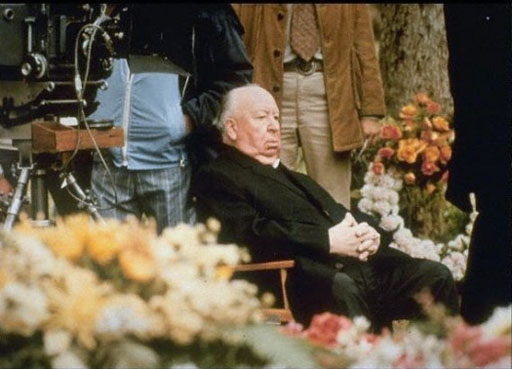
You wouldn't guess it from this blog, but my first love in the arts is not photography, but film and part of every film lover's bookshelf is Truffaut/Hitchcock in which the Truffaut interviews Hitchcock. Today I was googling a quote from the book when I found a site that contains recordings of the interview sessions. 25 MP3s in all. Exciting stuff for your inner film nerd.
Related: pranks in Vertigo, Hitchcock psychology, NYTimes review of Rear Window, NYTimes review of Pycho, NYTimes North by Northwest review, on MacGuffins, Hitchcock cameos, and A wonky but interesting essay on color symbolism in Vertigo.
August 1, 2008
Man on a Wire
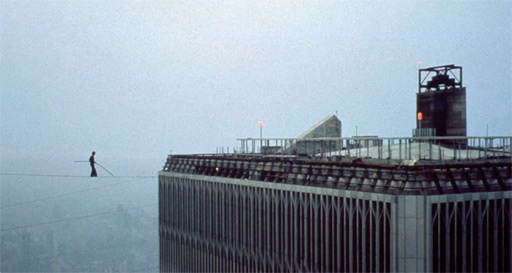 Still from the movie
Still from the movie
I saw Man on a Wire last week and the documentary has lingered with me. The film has several annoying elements: the main character is basically a mime (he's not actually a mime, but let's just say he has a mime-like personality, and who among us does not discriminate against the mimes), the film uses cheesy low-fi reenactments mixed with archival footage (a technique more suited to television than film), and the movie has been overpraised (always suspicious), but despite all that I can't deny the movie's resonance. It's a tale that touches on the act of creating art, mortality, creation, destruction, and ultimately vanity and betrayal which is more than I can say for most films I've seen recently. The filmmakers never mentioned 9/11 as the connection is implicit: the planning that went into this performance was the poetic inverse of the planning that went into the towers' destruction and perhaps this is why the film inspires such emotion in its audiences (many in our audience jumped to their feet and clapped at the end). A. O. Scott wrote in his New York Times review,
"It is easy to imagine that, in contemplating the scale and solidity of those brand-new towers, Mr. Petit saw them at least partly as the vehicle of his own immortality (whether or not he survived the crossing). No one looking up at the New York sky on a hazy morning 34 years ago and seeing a man on a wire could have suspected that the reverse would turn out to be true."Go see this film if you have the chance.
Related: Philippe Petit's Wikipedia page which includes scans of the the famous New Yorker covers he inspired. Also read Paul Auster's Red Notebook which contains a great short story inspired by the walk.
. . .
While browsing around for this article I found a neat little homemade site called Walking Art with many examples of epic walks. The site fails to include the great walking artist Hamish Fulton who is an artistic inspiration and whose family has been very kind to my family.
December 22, 2007
Charlie Wilson's War
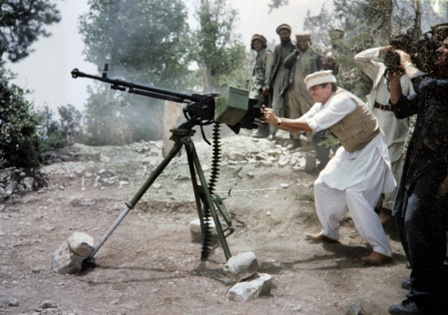
For my entire childhood in Texas Charlie Wilson was my congressman. I have yet to see the movie in which he is portrayed by Tom Hanks but I can heartily recommend the book on which the movie is based. It's the story of how one congressman from a district of no special importance managed to get the United States involved in a covert war that played a major part in bringing down the USSR and how that involvement ultimately gave rise to the Taliban and Osama Bin Laden's brand of fundamentalism. My guess is that at each step from which the story is removed from the man, the story is diminished, although perhaps these versions are more believable than the truth which is outrageous enough to seem fictional.
Wilson lived down the road from my first childhood home, and although he was rarely around, he was hard to miss when he was in town. He often held court on Saturday mornings at local breakfast spots like the Hot Biscuit and the Holiday Inn and if you were anywhere in earshot of his table you would inevitably catch loud profane tales of Washington skullduggery... And then there were always whispers about his various girlfriends around town. If you're curious about the man, he's profiled in today's Washington Post in an article titled "Charlie Wilson Sticks to His Guns". A football coach in Lufkin once said of Wilson, "You either love the fella or you hate him, he'll be re-elected unless he kills someone so you might as well love him. Hell, he might have already killed someone, with Charlie you never know."
Sidenote: The Post article mentions his campaign ads, which I remember fondly for their pure outlandishness. This is a somewhat tame selection. I hope someone digs up some of his earlier ads.
July 31, 2007
La Notte
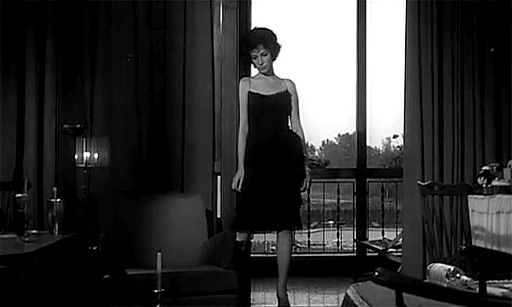 Still from Antonion's La Notte, click for a clip
Still from Antonion's La Notte, click for a clip
It is rarely tragic when old men die, especially when those men have lived rich and varied lives and yet the deaths of Bergman and Antonioni within hours of each other have a poetic touch of tragedy about them — it is the quiet departure of a generation. In their time both men were wildly popular figures in Europe and, if not wildly popular in the United States, respected and adored by serious film goers. My dad, a lifelong film buff, remembers it took a week to get tickets to an Antonioni film at The Thalia here in New York back in the 60's. A family friend remembers that even in Houston a new Bergman movie was a big deal. "Suddenly there would be all these people gathered together that you would never expect to see in Houston and everyone was turned on. And I mean TURNED ON. Do you know what I mean? They were excited about these films in a way you can't even imagine. They seemed to be revolutionary and new, dangerous and beautiful, sophisticated and sad all at once and you felt lucky to be watching." The passing of these men reminds us how hollow our prevailing culture has become. The tragedy for me is that they, perhaps, did not inspire enough, or maybe we didn't pay enough attention. Where are our Antonioni's and Bergmans? I don't see them out there.
June 20, 2007
Manufactured Landscapes, the Film
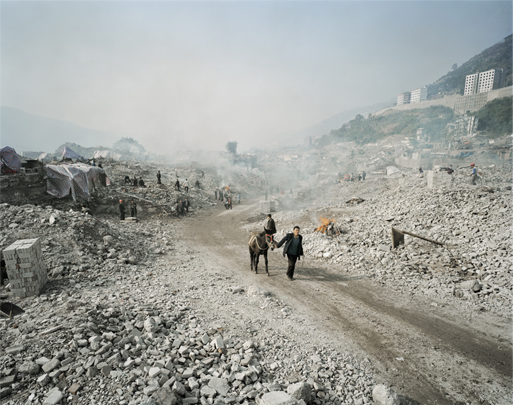
A film following photographer Edward Burtynsky through the making of his recent project Manufactured Landscapes opens today in New York. This is director Jennifer Baichwal's second documentary covering a photographer. She also directed The True Meaning of Pictures on Shelby Lee Adams' Appalachia. The word invariably used to describe this film is haunting... and indeed it is. I look forward to seeing how she has covered Burtynsky.
Online resources: the trailer, the press kit (complete with nice big 300 dpi images, Times review, the DVD
February 19, 2007
Babbling (a bit of a ramble)
After being turned away from In the Lives of Others at the Angelica, Jenn and I finally got around to seeing Babel tonight... Neither of us was excited about the movie as we both thought Iñárritu had lost his touch after the success of the great Amores Perros (hostile reviews also put a damper on our enthusiasm). We both found 21 Grams to be heavy handed and sort of falsely arty, and feared Babel was more of the same—maybe even more annoying. But both of us were pleasantly wowed. Jenn deemed it 'pitch perfect.' I kept thinking about how the scenes that were supposed to evoke 'the other'—the scenes in Morocco, and Mexico, and Japan—were all familiar to me via both travel and family... so the film felt oddly close even though all the situations were extreme...
Anyway in the cab home, we were discussing what we had just seen, when the cabdriver, a man named Mohammed from Dhaka turned to us and said, "You are talking about Babel. I didn't understand this movie. Why did they have a story about Morocco boy shooting tourist together with a girl looking for love in Japan and a story in Mexico?" We explained as best we could.
The conversation reminded me of discussions with my grandfather who remembered being confused during his first movie experiences by cuts. He remembered not being able to figure out how the actor got from one place to another so quickly.
Jenn's mother, a woman who grew up in the shadow of the Korean war, has a hard time understanding fiction. "Is this story a real thing?" she will ask. If it's not "real", more often than not the story will be dismissed. Movie flashbacks are confusing to her. "Why is it out of order," she asked once, "They should put the beginning at the beginning."
The parents of a friend of mine from India have a somewhat different problem. Having grown up on Bollywood films in which plots are endlessly recycled, they only accept a narrow set of possible storylines. They dismiss American films by saying, "No singing. No dancing. No hero. No wedding." It's almost as if for them the building blocks of narrative are hard coded and they can't deviate from the pattern.
The cabdriver listened carefully to our explanations about the connections between the various storylines. We explained things literally: The Japanese man gave his gun to the Moroccan and the woman who was shot was the mother of the kids the maid took to Mexico, but I wanted to say this, "The director is Mexican, all good Mexican directors tell stories about death. These were all stories about dealing with the death of family members." But I said nothing, knowing the words would have been wasted. "This was a strange movie" the driver replied, "you know it was very hot in the theater. It was hard to think."
September 28, 2006
The Science of Sleep
Most people are terrible at recounting their dreams ("I was an artichoke but I could dance like a mo-fo." - actual quote), and because most dreams lack narrative we listeners quickly grow bored. But Michael Gondry has made a career of telling us his dreams and what lovely dreams they are. Watching The Science of Sleep last Saturday at the Angelica I could literally feel our audience floating along for the ride. But the movie isn't good because it's fantastical (there are plenty of films that manage to be fantastical and dreadful) or because it does a good job recounting dreams, but because it taps into that feeling of falling for someone both physically close and emotionally far away. It's a painful/delicious/crazymaking feeling most of us can relate to. The movie ultimately falls a bit short because it tells us Stephane is in love with Stephanie without letting us fall in love with her ourselves (Stephane explains he falls for her because she 'makes things' which is fine for his character but perhaps not enough for the audience...or at least it's not enough for me). But this small criticism aside, it's the most fun and transporting picture I've seen in a long while and I might just have to sneak out to see it again.
Related: Gondry's "creepy" gifts, submit your dreams
Now speaking of sleep. To bed I must go.
June 16, 2006
The Cameramen
This week's New Yorker features a nice piece on Gregg Toland, the innovative and influential cinematographer who revolutionized the look of cinema (article is not online yet) shooting film monuments like Citizen Kane and Intermezzo. Visually his films are shockingly fresh. In the article Steve Soderbergh says of The Long Voyage Home "It looks like it was shot tomorrow."
Back when I was working at Paramount I became friends with Piotr Sobocinski the cinematographer behind Kieslowski's Red and the Decalogue. Our friendship came out of a mutual fascination with Toland. Piotr would have me dig up old production stills to try to figure out Toland's lighting setups. Usually they were startling in their simplicity, many big lights bunched together. This was similar to the technique Piotr often used. "Only one big light, like the sun, I do the same" he would say in his heavily accented English obviously pleased. My boss had helped bring Piotr over from Poland where he was making a fraction of his Hollywood salary, but Hollywood did not suit him. His missed his family in Poland and he hated the Hollywood system which didn't allow for artistic experimentation and flow. He would brood and when he was feeling particularly down he would watch Toland's films to cheer himself up. Through my job I helped him screen obscure copies films not available on video. He always wondered aloud what Toland would have done if he had lived a full life (Toland died unexpectedly at 44 in his sleep), because "great cinematographers do best work after 60". The deep irony of course is that Piotr would die at 43, and like Toland leave behind a wife and children and leaving us to wonder what might have been.
May 21, 2006
In Between Days

This afternoon Jenn and I were able to sneak out and catch a screening of In Between Days at BAM by director So Yong Kim. From the reviews I had expected a film delving deep into Korean-American culture but I think the reviewers didn't really get it... it wasn't a film about immigrants— it was a film about teenagers... The cultural notes helped define the characters but were ultimately peripheral. Like most good films about teenagers it is about teenagers who are in love, who can't say what they feel, and who keep hurting each other. It’s a quiet story told mainly in close-up picking up small and telling glances where the spaces between words are more important than the words themselves. The film is directed with a sure hand and the director managed to coax utterly realistic and emotionally hard-hitting performances from a cast of untrained but talented actors.
My wife missed the lack of establishing shots or wide shots and said the movie sometimes felt claustrophobic. She was also sometimes confused as to where she was in the story, this is a criticism she often has of female directors who she notes always seem to go for the gut with lots of close-ups. I was only slightly bothered by this although it’s a fair criticism. Most people have been conditioned to read films in a certain way... They need breathing room. This film would often track directly from one moment to another hours or days later without any of the standard transitions... I read this as poetic mindscreen... This is the way we remember things: Someone breaks up with you. That person calls. You are eating together. In your memory the moments run together without any in-between bits. Onscreen the result has an emotional intensity to it. The only breaks in the movie were sequences I read as dream sequences.... Voiced-over letters to an absent father read or whispered by the main character Aimie over grainy shots of empty landscapes. I thought this was lovely. Worked for me.
The film was shot on digital often with little light and it looked amazing-beautifully bleak. HD opens up realms almost impossible to shoot on film and especially with such a small crew. The sound design was also flawless with ambient noise calibrated to precisely play against the character’s emotions. The director spoke afterward and noted the crew size was often limited by the number of people who could fit in a single car—6. The crew was sleeping in the apartment being used as a set. The girl's room in the movie was the room she was sleeping in. Morning shots were morning shots and so on. Sort of a dogma film without the dogma. As someone who worked on movies where the crews generally numbered in the 100’s with endless layers of bureaucracy, personal filmmaking this with this level of finish and style is inspiring.
I don’t believe In Between Days has distribution yet, but by all rights it should. Look for it at festivals and later on DVD.
April 17, 2006
Werner Herzog Recordings
I recorded a few bits from The Burden of Dreams Werner Herzog documentary for my ipod because there's no seriousness like German seriousness: Herzog on making art. Herzog on the jungle: Part 1 and Part 2. The sound level is low so you'll have to crank up the volume also note they take a few seconds to load up.
Elsewhere: Werner Herzog shot with an air rifle, The famous Werner Herzog eats his shoe documentary, Kinski on Herzog, and finally a gallery of stills from the official WH site. More information and fun trivia in his wikipedia entry.
April 11, 2006
La Jette
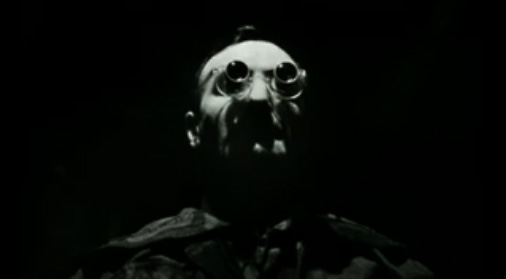
One of my favorite films La Jette, is available (temporarily I'm sure) in it's entirety on Google Video. This is the original version in French without subtitles. Download it for your computer/ipod while you can. The subtitled version of the film is available as part of a compilation on CD but it's expensive. I am happy to report (as I own a copy) that a book made of the movie's stills has become a collector's item.
March 28, 2006
Little Miss Sunshine & Dinah's Chicken
I'm really looking forward to checking out Little Miss Sunshine this summer. One minor issue with the trailer. The family is eating Dinah's Fried Chicken and Dinah's is in Glendale, California (I used to eat there regularly), but in the trailer the grandfather says the family is going to California...
March 14, 2006
Duck Season
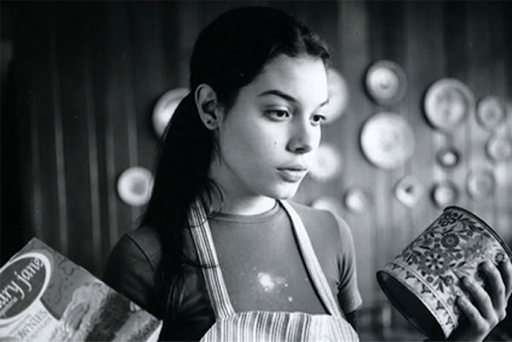
Ever since we caught the trailer for Duck Season (Temporada de Patos), by the Mexican director Fernando Eimbcke a few months ago, Jenn and I have been eager to check out the film. Last night we finally did. The frenetic trailer misrepresents the movie somewhat. The film about boredom of pre-teens stuck in an apartment without electricity on a Sunday afternoon is presented with bone dry deadpan humor that recalls Aki Kaurismaki or Jim Jarmusch. The camera is stationary, the dialog slow , and the humor often found in the tiniest of glances. Boredom is hard to pull off on screen unless you plant a few ticking time bombs to keep the audience hooked and while there are plenty of ticking bombs here, they don't get planted until rather late in the game. By that time about a quarter of our audience had already checked out (the lady next to me was snoring loudly about 15 minutes in). Still there are plenty of laughs here (and ultimately some real emotion) especially if you are patient and speak Spanish (much gets lost in translation). Add strong cinematography, a winning cast of young actors, a great soundtrack and you have a fun little movie. Check it out if you are in the right mood.
February 8, 2006
Tristram Shandy: A Cock & Bull Story
Jenn and I snuck out to watch Tristam Shandy: A Cock and Bull Story at the Angelica tonight. Perhaps we were just in the right mood, but we were both cracking up throughout (much more so than the rest of the people in the audience). The movie doesn't add up to much, and you have to be a fan of a certain type of English humor, but I recommend it nonetheless. How often do you actually guffaw? At one point I almost did a spit take. That's worth the admission price for me. Jenn's summary while walking out, 'I think Michael Winterbaum started shooting and at some point just said, "You know what, I've got nothin'... let's wing it", and you know what I don't hold it against him.'
Adendum: To the person who emailed me that "snuck" is not proper English. Not exactly proper, but popular.
January 12, 2006
The World, pt.2
Way back in October 2004 I saw a film called The World (Shijie in Chinese) by Jia Zhangke at the New York Film Festival. The film's US tour is winding down but if you live in Philadelphia, Chicago, or NY you still have a chance to catch it (dates here). The trailer doesn't really capture the sophisticated moody feel of this film, but you get some idea of it's lovely weirdness. Of all the movies I have seen in the last 2 years this is one the few that stuck with me. The DVD will be available in February.
December 26, 2005
Multiple SIDosis
One of my favorite outsider films, Multiple SIDosis by the great Sid Lavernts, is now online (alternate link). As noted on the WFMU blog, Sid is still around and will sell you music and video tapes via mail. You can email to get a list of available tapes here: sidchar@CTS.com (the list is always changing because Sid is always coming up with new stuff). If you are a camera person note that all the scenes with multiple frames were done IN CAMERA by filming a projected performance, rewinding the film and recording again! One can only image the number of takes. It's too bad this digitized version is such a poor copy, Jenn and I were lucky enough to see a first generation print at the American Cinematheque in LA a year or two ago.
You can find a good Sidography on Jack Austen's site. More good Sid commentary can be found on Cake and Polka, low culture & The LA Weekly,.
(Note many browsers are not set up to properly view mp4 movies, in this case you will see text when you click on the above link. If this happens, download the link to disk, make sure it ends in ".mp4" and open it in quicktime.)
Update: Multiple Sidosis is now on youtube!
October 6, 2005
NY Film Festival Mini Reviews
The Death of Mr. Lazarescu
The audience seemed stunned by the bleakness of this Romanian film about a dying man being shuttled from hospital to hospital in a nightmare of red tape. I was less distressed than most and found the film funny and occasionally brilliant but I heard lots of grumbling as we walked out the door. This one's not for everyone.
The Squid and the Whale
It opens this weekend. Just go see it, you won't be sad.
The President’s Last Bang
Probably the best film I saw at the festival. The Dr. Stranglelove comparison in the film festival's official blurb is apt. Finding deep comedy in assassination of Korean president Park Chung-hee the filmmaker pulls viewers through a roller coaster of a movie with a self confident wit that kept me hooked throughout. I hope it is released in the states so I can see it again.
Three Times
I'm a big fan of Hou Hsia-hsien. This film featuring 3 short stories about love is brimming with cinematic grace. Each of the stories is told quietly almost wordlessly. They each start slowly and work up to subtle moments where profound emotion is telegraphed with the slightest of gestures, but ultimately the 3 stories (all set in different eras but featuring the same 2 leads) didn't add up to much. Still if you are in right mood just turn off the left brain and let it all wash over you.
Something Like Happiness
What is it about Eastern Europeans making films that leave you feeling utterly depressed? Is crushing the soul their idea of a good time? Is life in the Czech Republic really so grim? I'm sure this is a wonderful film but after the ended all I could think about was having a stiff vodka tonic.
Who’s Camus Anyway?
This Altmanesque Japanese comedy did something I don't think I've ever seen done properly on film-it captured the feel and texture of college life without descending into camp. Part of secret was that the actors were actually college aged (and not 25 year olds), part of it was that the kids always seemed to be running everywhere, and part of it was the messy web of relationships spun by director Mitsuo Yanagimachi. This film sort of ran out of steam in the end, but I enjoyed the ride. My only major criticism--muddy camerawork.
Tale of Cinema
I didn't see this film but Jenn did and she loved it. We became big Hong Sang-soo fans after seeing some of his films in LA. Jenn calls Hong Sang-soo the first Korean auteur and I don't think it's just ethnic pride talking. This guy is good.
September 3, 2005
Wong Kar-Wai's 2046
This movie has been both praised and damned... as a Wong Kar-Wai worshiper I went in with high expectations.
For me it was a lovely mess, painfully beautiful visually but almost haphazard in it's storytelling. It's really a collection of short stories held together more by the mood than narrative. But at some point I just stopped caring about the overall story and just enjoyed drinking in the visual lushness of each scene and the tangible melancholy of each shot. Tony Leung is top notch as usual, but this film belongs to Zhang Ziyi who is heartbreakingly good. Faye Wong & Gong Li's performances seem almost inert by comparison. The problem for me was unlike In the Mood For Love a film whose melancholy added up to an emotional punch, 2046 left me thinking about the actual filmmaking... admiring the sets, wardrobe & photography, wishing the writing had been sharper, and wondering how I would have re-organized the film to make it add up to something that didn't break my suspension of disbelief.
July 18, 2005
Taxonomy of Hate
I hate a great many things. I hate it when people say "have a good one". I hate cats. I hate renting and I hate humidity. I hate mosquitoes, people who call me chief, and the way cereal gets soggy so fast. I hate Mac Word 6.0, Karl Rove, and bad fonts. I hate Costco and PC Richards. I hate my forgetfulness. I hate rats (they scare me to death) and bureaucracy and that kid named Bill who spit on me in the 5th grade (I pegged him with a rock a few weeks later). I hate cleaning hair from drains, golf, Lance Armstrong bracelets, and the death of punk rock. I hate my clothes. I hate anything with coconut, the letter q, and the robber took my grandfather's chest full of photos. I especially hate losing friends over time, and the fact that Elsie's Oke Doke Pub on 84th between 1rst and 2nd is now closed. I hate not having sent all those wedding gifts and that I never write longhand letters anymore. I hate hate hate many of my friend's taste in music, a scar on my leg, and the inevitability of death (not my own so much, but of the people close to my heart). I hate not having a garden for Jenn to garden in; I hate no longer caring about baseball; I hate eggs. I hate the guy who went out of his way to blackball me from a club in college, direct overhead lighting (I prefer lamps), white walls, and the sound of my voice when recorded. So many things to hate in this imperfect world... People who know me will tell you I hate most movies these days. But I saw a movie I loved tonight. It's called, Me You and Everyone We Know by Miranda July and I think you should see it because when someone makes a great little film, or writes a book that moves you, or makes music that gets you dancing, there is, at least for a moment, a little less hate in the room and that can't be all bad.
April 2, 2005
new directors festival mini-reviews of this week's films
Le Grand Voyage- A spectacular film the kind you wish they made in Hollywood and never do. Deeply funny and moving (so moving an audience member died. No really, he was quite dead).
Junebug-Southern, sexy & mildly funny.
The Devil and Daniel Johnston- top notch documentary, also really moving (I got choked up), but I'm biased, I love Daniel Johnston and the director is a cool guy.
South of the Clouds- WTF? Maybe I'm too dumb to understand but this film seemed like a meaningless mish-mosh. Couldn't wait for it to finish.
Starlit High Noon- This film obviously influenced by Wong Kar Wai is slow and beautiful . 3 people in love with the wrong person.
. . .


March 22, 2005
The Devil and Daniel Johnston
All you New Yorkers should check out a screening of The Devil and Daniel Johnston, a documentary by director Jeff Feuerzeig. I've had lunch a couple of times with Jeff in LA and if anyone can do Daniel Johnston justice, he can as he's someone who lives and breathes punk rock. Film and ticket info at Lincoln Center's New Director's Program Page. It plays March 30th and April 1rst.
October 13, 2004
The World
Overheard diner conversation between an older Russian man with a pinkie ring & a bad suit and a young Latina with an overly fluffy sweater & big Japanese looking shoes.
girl: It's only money.
man: Money. Why do we always talk about this? Six thousand.
girl: We won't have to talk about it if you write the check.
Silence for a minute or two
man: I write check and we don't talk about these things.
girl: Write it now.
man: Six thousand.
girl: Seven thousand five hundred.
Silence. She slurps her drink.
man (quietly): ok
He pulls a check from his wallet and makes it out. The girl inspects it. Folds it carefully and puts it in a wallet in her purse.
girl: Let's go.
They leave holding hands.
--
I saw the last of my film festival movies tonight - The World, by Jia Zhangke. Jenn was movied out so I went alone. She missed out. Thumbs up on this one. If you love Beijing, this film is for you. Set in a huge amusement park featuring "architecture of the world" including a large scale Eiffel Tower, World Trade Center and pyramids it follows a love affair between two young immigrant workers. Zhangke has a light touch he tells a lyrical sad story but always with good humor. It's one of the first films I've seen set in modern Beijing that shows the city the way I experienced it. I enjoyed the slow poetic rhythms of the film and feel it will stick with me for some time. The afterglow of the picture made the late night subway home feel moody and cinematic. The Donald Byrd and Screamin' Jay Hawkins on the iPod only increased the mood.
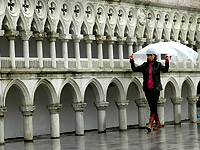
October 10, 2004
More Festival Updates
Tonight, two satisfying films:
We just returned from Zhang Yimou's House of Flying Daggers which is loads of fun despite a muddled ending. It's a better movie than Hero and should be a bigger hit. Zhang Ziyi was lovely as usual although she showed up before to greet the audience before the film in a cheesy bridge and tunnel outfit (once the movie started rolling it took a few minutes to mentally erase the tight pants and midriff... come to think of it I shouldn't use the bridge and tunnel pejorative since now we're part of that crowd!). Flying Daggers has several great set pieces one the one in the forest is pure giddy action sure to set the bar for quite a quile... I'm sure it is only a matter of time before we see half baked imitations this scene American movies. I should note Jenn hated the film deeming it cheesy... but she was also sleepy and not feeling well.
Ultimately more satisfying was the first movie we saw, a Korean film Woman is the Future of Man by Hong Sangsoo. This film felt revelatory both for it's frank sexual themes and portrayal of Korean urban life. The story is simple. Two old friends meet in a restaurant and begin remembering the intense relationships each of them had with the same woman. They seek the woman out to see what's happened to her (and perhaps searching for closure)... Of course they find her and of course things quickly get even more confused. The filmmaking is top notch, funny and melancholy, and reminded me at various times of Kieslowski and Antonioni... but really it was it's own thing. The soft spoken filmmaker was verbally attacked by several audience members afterwards. In general they thought the film was sexist. One girl said she wanted to "kill the director". I think the people speaking were confusing the culture the film portrays with the filmmaker himself. If anything the film was not reveling in sexist attitudes, but was showing how alienating and shallow certain aspects of male behavior can be and using that behavior to illuminate larger truths...
October 5, 2004
In the Battlefields
At the Film Festival we saw Danielle Arbid's In the Battlefields. This film exemplifies what the NY Film festival is all about--a showcase of brutal honest filmmaking by a first time director from a country most people in the US know little about. The movie is an autobiographical coming of age tale of a young girl struggling with her disintegrating family in wartime Beirut. The story is told almost without sentiment from a completely interior/personal point of view. While it will probably not get distribution in the US, if you see it listed at upcoming festivals, try to catch it.
Ms. Arbid spoke afterwards. Jenn and I both noted she seemed super cool. The type of person you'd like to meet for dinner, drinks, and a long discussion about life...
--
We like riding in empty subway cars at night:
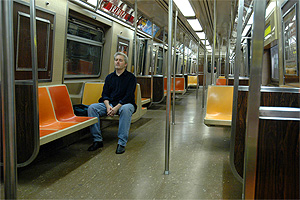
October 3, 2004
NY Film Festival Day 1
Roger Ebert called Undertow (by David Gordon Green) a masterpiece. Ebert's getting soft I think. We just saw the film at the New York Film Festival. I found it badly miscast (is Dermot Mulroney always the kiss of death?), but watchable with a few nice moments. Despite being muddled, it feels original with a deep sense of place an a feel for a region rarely seen except as parody or caricature on screen.
Jenn gave it a 3 out of 10 (I think she was overly negative because of the cheesy Philip Glass score and the looking-back-to-the-70's freeze frames which she didn't get). The problem I think is that David Gordon Green was overpraised for George Washington (which was a beautiful little film), was quickly a declared genius, and was allowed to run free without adult supervision. Now everyone expects each of his films to be some sort of revelation. A tall order for anyone. The result in this case is a minor southern gothic mess that most audiences won't put up with, but that critics will praise because because of it dares to aspire to that great tradition of auteur filmmaking almost gone from the American scene.
--
We walked over the bridge today... I got Jenn to do one of the silly jumping pictures we like to do. This is Jenn landing:

